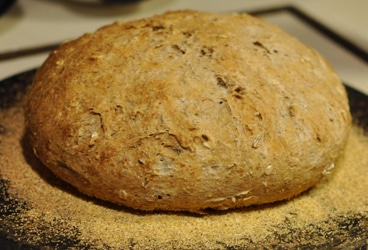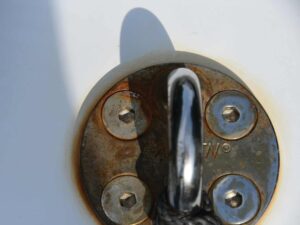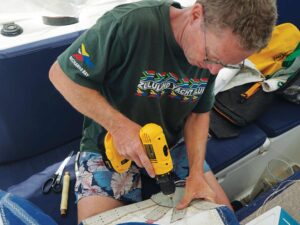
Del Viento- bread
Bread: is there another non-boat-related topic covered more extensively in the sailing magazines and cruising books? It’s recurrent (and resurgent since the 2007 release of _Artisan Bread in Five Minutes a Day_
For a couple-month span while still living in a house, we tried and tried to make bread. The results never surpassed marginal and were often closer to inedible. This was especially frustrating because the loaves were nearly always beautiful things…that tasted like cardboard. As our cast-off date approached, our lives grew busier and busier. We stopped the bread experiments and eventually forgot all about them.
Then, in Mexico last year, the French family aboard _La Loupiote_ gave us a portion of their mother (bread starter). I wrote all about it. We followed Delphine’s instructions and the results were encouraging, right off the bat. Granted, disappointment is a product of expectations, and we were in Mexico, eager to celebrate anything better than Bimbo. Regardless, our joy was motivating and we’ve been nurturing and experimenting with our starter ever since.
I took over bread-making duty about six months ago and sometime this past month, I realized…I had arrived. I reliably turn out very good loaves of bread and it feels effortless. I don’t even measure ingredients or time dough rises, I just create.
My advice to any cruiser whose ever been frustrated trying to make good bread, is twofold. First, stick with it. Even after nearly a year at this, I know there is still a ton to learn and I look forward to experimenting more. Second, though most recipes call for dry yeast packs, instead try to either mooch some starter off of someone or make your own. I think using a starter makes everything easier.
I’ll leave you with two more things. First, the crew of Sweet Pea posted a series on their blog that is pretty close to the bread-making method I use (minus the oil and cooking spray). Second, check out the following tiny excerpt from Henry Miller’s essay, “The Staff of Life” written in the mid-1940s.
“…Begin today by baking your own bread. First of all, you need a stove. A wood or a coal stove. Not a gas range. Not an electric apparatus. Then let the flies in. Then roll your sleeves up and get your hands in the dough. Lick your fingers. Never mind if you lose your job. Eat your bread first, then maybe you won’t want to work in an office or a factory. Life begins with bread.”
And if you can’t make your own bread? Following is Miller’s recipe, from the same essay, for making mass-produced store-bought loaves palatable. This should work even for Mexico cruisers and their Bimbo bread:
“I have now found that the only way to eat our most unwholesome, unpalatable and unappetizing American bread, the staff of our unsavory and monotonous life, is to adopt the following procedure. This is a recipe, so please follow instructions to the letter.
__
“To begin with, accept any loaf that is offered you without question, even if it is not wrapped in cellophane, even if it contains no kelp. Throw it in the back of the car with the oil can and the grease rags; if possible, bury it under a sack of coal, bituminous coal. As you climb up the road to your home, drop it in the mud a few times and dig your heels into it. If you have a dog with you, let him pee on it now and then. When you get to the house, and after you have prepared the other dishes, take a huge carving knife and rip the loaf from stem to stern. Then take one whole onion, peeled or unpeeled, one carrot, one stalk of celery, one huge piece of garlic, one sliced apple, a herring, a handful of anchovies, a sprig of parsley, and an old toothbrush and shove them into the disemboweled guts of the bread. Over these pour first a thimbleful of kerosene, a dash of Lavoris and just a wee bit of Clorox; then sprinkle guts liberally with the following—molasses, honey, orange marmalade, vanilla, soy bean sauce, tabasco sauce, ketchup and arnica. Over this add a layer of chopped nuts, assorted nuts, of course, a few bay leaves (whole), some marjoram, and a stick of licorice cut into fine pieces. Put the loaf in the oven for ten minutes and serve. If it is still lacking in taste, whip up a chili con carne piping hot and mix bread with it until it becomes a thick gruel. If this fails, piss on it and throw it to the dog. But under no circumstances feed it to the birds. The birds of North America are already on the decline, as I pointed out earlier. Their beaks have become dull, their wing-span shortened; they are pining and drooping, molting in season and out. Above all, they no longer sing as they used to; they make sour notes, they bleat instead of tweeting, and sometimes, when the fogs set in, they have even been heard to cackle and wheeze.”
--MR

Eleanor poses at the scene of my flour transfer. I buy 10 kgs each of white and whole wheat flour and portion them into this old olive vessel a circumnavigator picked up in Greece and sold to us for a buck at a Mexico marina swap meet. Between this and three of the smaller white canisters, we can stow 20 kgs of flour aboard.
I__n our twenties, we traded our boat for a house and our freedom for careers. In our thirties, we slumbered through the American dream. In our forties, we woke and traded our house for a boat and our careers for freedom. And here we are. Follow along at http://www.logofdelviento.blogspot.com/








